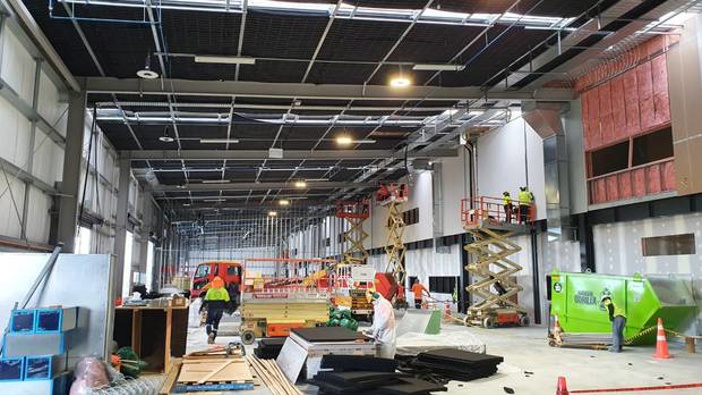Follow
the podcast on


New Zealand's looming Covid-19 recession is forecast to produce a dramatic leap in student numbers at polytechnics and wānanga.
Ministry of Education forecasts produced for last week's Budget project increases in domestic fulltime-equivalent students next year of 32 per cent for polytechnics and 34 per cent for wānanga.
Smaller, but still substantial, increases are forecast for universities (up 9 per cent) and private training providers (up 25 per cent).
The increases are based on a forecast doubling of the unemployment rate from 4.2 per cent at last count to 8.6 per cent in the 12 months to June next year, leading many people who lose their jobs to seek retraining for new careers.
Student numbers are then forecast to drop back almost to where they started as the unemployment rate falls back to 5 per cent by the year to June 2024, as improving job prospects suck people back into the workforce.
The forecasts signal a big reversal of fortune for polytechnics, which have struggled financially as their student numbers fell by 21 per cent from a peak in the global financial crisis in 2010.
The Government responded by merging all 16 regional polytechnics last month into a single NZ Institute of Skills and Technology, which will be based in Hamilton.
Last week's Budget may further boost enrolments by providing free training in institutions and workplaces for two years from July 1 in "courses linked to industry skills needs, in building and construction, agriculture and manufacturing, and also vocational courses like community health, counselling and care work".
Auckland's Unitec chief executive Merran Davis expects growth in construction and infrastructure, horticulture, aged care and other health areas, early childhood education, information technology (IT), sport and film production.
/cloudfront-ap-southeast-2.images.arcpublishing.com/nzme/ROGBSVYAPJGOVF5YZFSBFO2GAA.jpg)
Unitec chief executive Merran Davis sees growth in areas such as construction, horticulture and IT. (Photo / Supplied)
"We're negotiating a very exciting partnership with the creative technology sector," she said.
"In the near future, we'll also be launching half a dozen IT industry-specific short courses, followed closely by construction and others in due course."
Unitec's student numbers dropped by a third between 2012 and 2018, but it cut staff numbers by only a fifth in that period, so Davis said it still had capacity to cope with more students.
"We went through a process of losing a lot of staff over a couple of years, and got to the point where we actually said we were not going to reduce further," she said.
"We felt that if we lost more it would make it hard to respond to a changing environment, so at this point we have held on to staff and that does give us some opportunities."
/cloudfront-ap-southeast-2.images.arcpublishing.com/nzme/5IX2J6ANJFE55B35EIV2OYZDGY.jpg)
Manukau Institute of Technology's new $55m "TechPark" trades training centre is due to open later this year. (Photo / Supplied)
Manukau Institute of Technology (MIT) chief executive Gus Gilmore said MIT was well placed to expand trades training with a new $55m trades school under construction.
Te Wānanga o Aotearoa head Te Ururoa Flavell said young Māori usually bore the brunt of any recession so the wānanga was gearing up to expand both its traditional offerings, in areas such as forestry and teacher training, and in new areas such as trades.
/cloudfront-ap-southeast-2.images.arcpublishing.com/nzme/U2S2OL52NJF4HPEDQZOFZCNY4U.jpg)
Te Ururoa Flavell says Te Wānanga o Aotearoa is keen to expand into new areas in trades training. (Photo / File)
"We are not in the trades area much yet. We have a couple of programmes. That's where we see there is going to be a huge area for development," he said. "That is at the core of what Te Wānanga o Aotearoa originally stood for."
Craig Musson of Independent Tertiary Education NZ, representing private providers, said his members were also flexible about expanding courses to meet demand or shifting staff out of shrinking areas, such as international education, to service growing fields.
/cloudfront-ap-southeast-2.images.arcpublishing.com/nzme/K23SSMPEE5GWXLOK3BY5GOEAOY.jpg)
Craig Musson says private providers are flexible enough to expand into growing fields and shift staff into them. (Photo / Supplied)
Tertiary Education Union president Michael Gilchrist said institutes should drop threats to cut staff due to the loss of international students, because they now needed to gear up for increasing domestic enrolments. He said Whangārei-based Northtec was still proposing to cut "a handful" of staff because of the loss of international students, and universities have asked for reduced working weeks.
Tertiary analyst Dave Guerin noted that the forecasts had a wide margin of error and that the ministry based the Budget on the low end of the margin of error for polytechnics, wānanga and private providers.
/cloudfront-ap-southeast-2.images.arcpublishing.com/nzme/ZEX3AKLYQJGDDB7XRBMHSR5D2Y.jpg)
Dave Guerin: "I think we will have a substantial increase in enrolments next year, but it's too early to say what it will be." (Photo / Supplied)
That would reduce next year's roll increases to 16 per cent for polytechnics and wānanga and 12 per cent for private providers, while planning for universities used the central growth estimate of 9 per cent.
"I think we will have a substantial increase in enrolments next year, but it's too early to say what it will be," he said.
Take your Radio, Podcasts and Music with you









